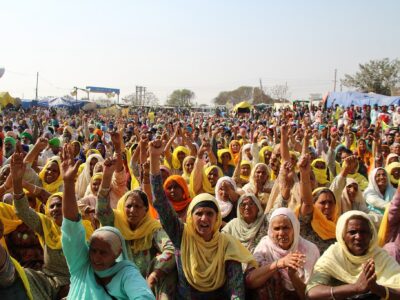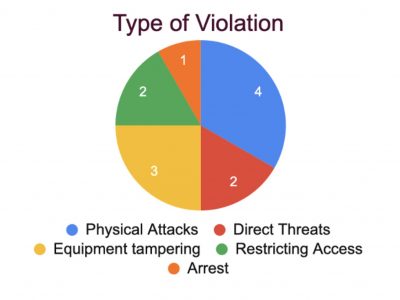Latest posts by Advox
How the government in Sudan legalized internet categorizing and content filtering
One regulation obliges telcos to block and filter a list of URLs, and to “daily monitor” the filtering equipment to verify that it is being updated.
Unfreedom Monitor Report: Brazil
Advox research into digital authoritarianism in Brazil is now in a report. Read an excerpt and download the full pdf.
Access the Unfreedom Monitor database
The Unfreedom Monitor is an Advox initiative to deepen our understanding of the relationship between technology and authoritarian power. In the first phase of this project, researchers working in 11 countries and four key themes conducted analysis of incidents, narratives, and media items, to explain acts of digital authoritarianism and...
Understanding India’s Central Media Accreditation Guidelines 2022
A new guideline for media accreditation has drawn a negative response from the Indian press community, activists, and concerned citizens as it provides sweeping power to the authorities.
Exploring the use of tech-based tools in India to curb dissent during protests
India is seeing the increased use of technology to monitor dissent and surveil dissenters, particularly protesters, which has a chilling effect on the freedom of expression.
Supporters demand freedom for Egyptian activist Alaa Abd El Fattah
His lawyer spoke of Abd El Fattah's declining mental health and quoted Abd El Fattah saying, “I can’t carry on.”
In Pakistan, social media platforms risk bans under new ‘draconian’ rules
New rules vesting the government with the power to regulate online content and ban entire platforms drew criticism from human rights groups and tech companies.
An internet with borders: A perspective from Pakistan
Pakistan recently adopted new rules imposing fines and bans on services that fail to take down and restrict content within short time frames.
Five new digital media platforms for uncensored news from Colombia
In Colombia, a new generation of journalists are fighting self-censorship and investigating corruption.
Somali journalists say new media law will muzzle free press
Somalia’s media workers say that the draconian new media law will repress journalists who are already struggling in a hostile media environment.
European Court of Human Rights verdict vindicates Macedonian columnist convicted of defamation in 2010
"This verdict is important for Macedonian journalists, columnists, and overall, for the people that appear in public, as it encourages them to be principled, honest, brave and persistent."
Shutdowns, throttling and stifling dissent online: Africa’s new normal, Part II
Weaponizing digital blackouts or social media clamp down by Algeria, Ethiopia, Guinea, Nigeria, Sudan and Tanzania is an ominous sign of a deeply problematic system of governance.
Shutdowns, throttling and stifling dissent online: Africa’s new normal, Part I
African governments are using school examinations and politically charged moments as an excuse to effect digital blackouts or clamp down on social media.
October – A bleak month for freedom of expression in Sri Lanka
This article offers a snapshot of challenges to freedom of expression in Sri Lanka during the month of October, 2020.
Internet throttling, SMS blocking in days leading up to election in Tanzania
With just 24 hours before election day, internet users in Tanzania and Zanzibar, have reported widespread limited access to internet services including social media platforms such as WhatsApp, Facebook and Twitter.
Pakistan lifts ban on Tiktok with conditions
Pakistani social media users strongly reacted to the ban on TikTok and initiated #UnBanTikTok #TikTokbanned hashtags against it and criticized the telecom industry regulator.
For journalists in Kenya, ‘2020 is the worst year on record’
Since the novel coronavirus outbreak in Kenya in March, more than 47 cases of arbitrary arrest, assault and harassment have been perpetrated against bloggers, online activists and human rights defenders.
Rights groups in Tunisia mobilize against police protection bill
Article 7 of the bill grants security forces immunity from prosecution for the use of excessive and lethal force against citizens in situations “they deem dangerous”
Facebook denies accusations of fuelling hate speech and pro-BJP bias in India
On September 16, Facebook India’s chief issued a statement denying accusations that the social media giant is making profits by giving a platform to hate speech in India.
In Sudan, women and minorities targeted by online harassment lack legal protections
Sudan currently does very little to protect women and other minority groups and communities from harassment, putting their ability to exercise their fundamental rights online at risk.




















